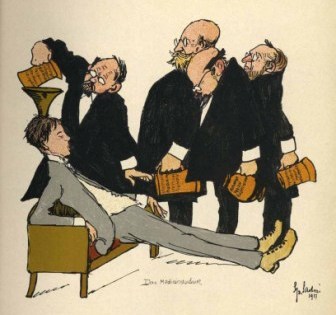
"Das Medizinstudium" - Bierzeitung 1917. Universität Zürich
 "Das Medizinstudium" - Bierzeitung 1917. Universität Zürich |
Exceeding the limits |
| Critical self-observation revealed to me first difficulties with my memory in 99 and 03, i.e. before my 50th birthday. In the meantime, these troubles have "deteriorated" considerably. I use quotation marks here, because I'm still hesitant to attribute these difficulties to pathological or even degenerative changes. |
| I increasingly suffer from several kinds of memory troubles: (1) I have difficulties to remember events that happened minutes to hours ago. (2) As allready exemplified in my essays 9 and 5 years ago, my ability to remember names is reduced. I'm aware of this fact, because my capability to recognize faces seems unaffected. |
| In addition, (3) my typing errors have changed from simple letter exchanges, due to hitting the neighboring key, to writing a whole wrong (short) word. This mishap came to my attention only recently. (4) Typing majuscules has been difficult for me since about 10 years; apparentlly, it has become a great problem for me to press the shift key right in time. |
| What could be the reason for these troubles? Am I right on the way to become a helpless nursing case in a decade or so? What a horrifying imagination... I hope I'm not, and therefore I'm thinking about less intimidating explanations. |
| From an evolutionary point of view, a limited capacity of our brain to remember the names of people is no big surprise. If you would try to screen your memory stores for the sheer number of names you ARE still able to link to certain faces, you would probably end up with several hundreds. During the time our language capacities evolved, tele- communication and writing was unavailable to us. If the capacity to store names was limited to a few hundreds, this would have been no disadvantage for our survival or mating success. In fact, in our whole stone-age life we rarely or never became acquainted with more than a few dozens of fellow men requiring specific names. |
| Maybe it WAS an advantage, to remember more than just a few dozens of faces, especially in light of the importance of social relations for humans. In that respect, a simple decision friend-or-foe was most likely sufficient to favor survival, without delaying such important decisions with a fruitless name search. |
| In addition to difficulties with personal names, (5) I increasingly fail to remember specific words. Only a few years ago, it was no problem for me to write for hours without the help of a dictionary, consulting our department's sample in the secretary's office just once or twice a day. Today, I couldn't write without my personal dictionary on my desk. |
| I'm also (6) getting troubles with following the plot of a movie. Interestingly, it may happen that I see a movie that I have enjoyed years ago, and now, upon second viewing, I find the story inplausible and difficult to understand. |
| While both phenomena might in part be explained indeed by a beginning loss of memory, they might also be a consequence of higher standards. In writing, I'm only satisfied if I find the one word that fits best, and in my "riper years", I expect more than just action and thrill watching a movie. |
| Saturation of neuronal networks could be the underlying cause of beginning troubles with acquiring new memory in advancing age. Thus, our capacity to remember names, words and complex relationships might reach its natural bounderies, given the myriads of impressions increasing in number and complexity over the decades and remaining somehow represented in the complex reverberating networks of our brain. |
| It would be interesting to calculate the amount of information, that theoretically can be stored in the various modules of our brain (Ganguli et al. 2008). Since our brain is clearly limited in size and function, its memory performance should be limited as well. Sometimes I wonder, what kind of life our stone-age ancestors were leading many millenia ago or, more importantly, at the time our modern species homo sapiens appeared on the scene about 100.000 years ago. |
| Their survival and their mating success probably did not depend on the utmost refinement of their vocabulary or the number of movies they could remember in detail. It was left to our technically enhanced communication habits to reach the boundaries of our brain's capacity. Maybe we should be more careful with this boundary; it may be dangerous to press forcefully more information into our brain than can be handled smoothly by this delicate organ. |
| 8/08 < MB 10/08 > 10/8 |
| S. Ganguli, D. Huh, H. Sompolinsky (2008) Memory traces in dynamical systems. Proc Nat Acad Sci USA 105: 18970-75 |